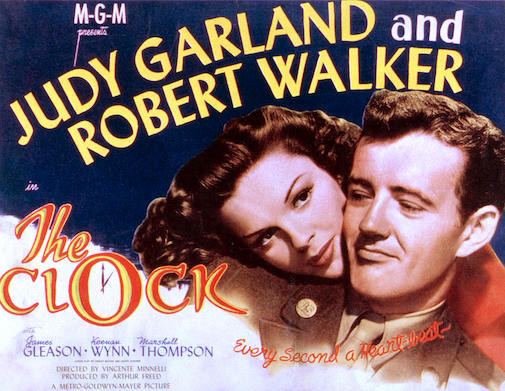Judy Garland @ 100: "The Clock"
 Friday, June 3, 2022 at 8:00PM
Friday, June 3, 2022 at 8:00PM by Eurocheese

After the milestone of her smash hit Meet Me in St. Louis, having proved herself as a now adult leading lady, where would Judy head next? She decided to build up her acting cred with her first purely dramatic role in The Clock, a romance wherein Garland’s character Alice falls for a soldier on leave in New York City. It’s not surprising that audiences at the time were expecting her to sing (she always had before), especially since the music swells in several moments as if she's about to do so. Despite the lack of songs, critics at the time appreciated the film's sweet tone and it's hard not to get swept up in the couple’s earnest romance.
Garland had struggled with addiction for years, but as she fought to maintain her weight and supported co-star Robert Walker as he drank his way through his deteriorating marriage, her addiction grew...

After she butted heads with the original director Fred Zinneman, her then-lover and still-rising director Vincente Minnelli (Meet Me in St Louis) was brought on to finish the film. They were married a month after The Clock's premiere. It’s difficult seeing her wide-eyed, heartfelt performance and think about how far removed her tumultuous experience surely was from the wistful optimism of her character.
While The Clock borders on saccharine at times, Garland finds all the right notes to play as her defenses give way to the whirlwind romance. Is she making a huge mistake, as many other characters warn? The film wisely doesn’t answer, instead showing the ups and downs of the couple’s days together without judgment. Alice shows such dreamlike hope when asking about the soldier’s past, as if she is drawing their future plans in her head as he speaks. When they lose each other at one point and Alice is questioned for desperately seeking someone she has only known for two days, her determination only grows. She certainly questions her own judgment, though, sobbing with disappointment at one point late in the film when she believes she’s made a mistake. Still with each decision Garland brings the audience in. We understand, for better or worse, why she is making the next choice. One of Garland’s strengths as an actress was the ability to convey strong emotions in such an open, unambiguous way that it resonates with anyone who has felt in a similar way. Her smile is radiant, and her tears heartbreaking.
The Clock captures a time when this type of meeting would have been far more common, and I left the film with a much better understanding of why someone who doesn’t typically make life decisions at the drop of a hat would find themselves caught up. In the end, Minnelli keeps the focus on Alice walking confidently into a world where she has no idea what will come next. If nothing else, it’s a nice reminder that the decisions we make match our needs in the moment, and a life spent avoiding mistakes at every turn isn’t a life we should wish on anyone.

The Clock (1945) is currently streaming on the Criterion Channel along with 11 other Garland films
 Judy Garland,
Judy Garland,  Robert Walker,
Robert Walker,  The Clock,
The Clock,  Vincente Minnelli
Vincente Minnelli 


Reader Comments (1)
It is a lovely little picture and in its small way an essential in her work since it does give us a chance to see her as just a regular girl without her enormous gifts punching her across.
She and Robert Walker pair well, both seemingly without a care in the world than their present situation. It's a sign of both of their professionalism that the phantoms haunting them never are allowed to intrude on the film.
I've read that Minnelli purposely made New York a third character in the film both in it's impersonal bigness and isolation as well as its vibrancy. That adds a great deal to the film without distracting from our young hero and heroine.